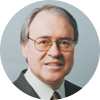My father was a chiropractor and he did house calls. On Wednesday nights, while my mother attended the weekly women's meeting at the Odd Fellows and Rebekahs hall in our small town, dad loaded up the portable adjusting table, fired up the Pontiac and drove off to treat a few patients in their homes. I went with him.
I recall we usually visited three homes every Wednesday night for quite some time. Dad told me we were going to these homes because the patients were unable to travel to his office.
At the first home, we met a woman who seemed quite healthy, as judged by my 6-year-old brain. Her husband would sit on a kitchen chair, watching, while my dad would adjust Mrs. Knutson on his "fold-up" treatment table, which looked to me like a big, awkward suitcase.
Mrs. "K" would talk with dad for a few minutes, but then blurt out a short exclamation, not quite understandable to me. Then she would be just fine – until several minutes later, when she would erupt again with what I recognized was a "naughty" word. I now suspect the woman was probably suffering from Tourette's syndrome, defined by the National Institutes of Health as a condition in which the patient has "vocal or physical "tics," or repetitive, involuntary movements or vocalizations."
The Knutsons said chiropractic care helped cut down the frequency of Mrs. K's verbal "tics," which had made her feel ashamed and embarrassed. Dad never said much about any patient, but when I asked about Mrs. K, he just said, "She's getting better."
The next stop was a small farmhouse inhabited by a very old woman and her less older daughter. I told my mother after my first visit, "The place is full of stuff," which was a stark understatement. Dad and I had to enter the house through the garage, since no one could walk in the front door due to the mountain of "stuff" piled precariously high everywhere, in every room.
I now understand that the elderly woman and her daughter were "hoarders" and today, could be celebrities on a TV reality show. Dad told me "not to touch anything" and to sit still on a folding chair while he treated the daughter, Ms. Helen. Later, I heard my parents talking about Ms. Helen, who had been a "spinster," whatever that meant. The rumor was that she had not left that house in about four years, according to the rural postal carrier.
The diagnosis was probably "agoraphobia," the fear or anxiety experienced in crowds or just being out in public. I don't remember if chiropractic treatment helped Ms. Helen, but I do remember how appreciative she and her mother were for our visit and my father's care.
The third and final stop on our house-call circuit was the Stuart house. I recall that Mrs. Stuart was usually strapped into a wheelchair when we arrived. The diagnosis was rheumatoid arthritis, and it was bad. Her hands were disfigured and crooked, and she could no longer walk.
To make matters worse, Mrs. Stuart had suffered a severe stroke years before and couldn't speak clearly. She would always take my hand in her gnarled fingers and give me a little "squeeze," which was a bit intense for a 6-year-old, who had never seen hands like hers. But her cloudy blue eyes and her sweet smile made me wish for a cure for everything and anything that could cause such a horrible disease.
Looking back, I am aware now that my father must have had a strong purpose in doing house calls for these patients. It certainly could not have been the money, since he only charged $2 for an office call in those days. These patients were isolated by their maladies, unable to function in a social world. The pain they experienced was probably as much psychic as physical. It was the 1950s and not much was known about what conditions chiropractic care could, or could not, improve.
My father was never taught any limits to the removal of "nerve interference" by using the chiropractic adjustment. Knowing him, when Dad was asked to help, he probably said something like, "Let's give it a try."
Click here for more information about John Hanks, DC.





